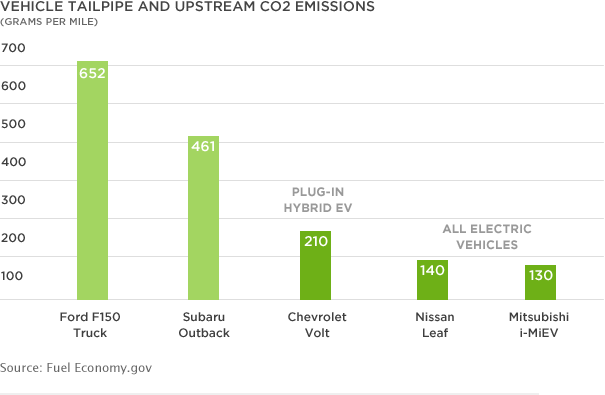Facts & Impacts
Electric vehicles (EVs) offer a surefire route to increasing Vermont’s energy independence, dramatically reducing the carbon footprint of Vermont’s transportation sector, and guarding against rising petroleum prices.
The Facts about EVs
- Electric vehicles (EVs) can save you $1,200 or more on maintenance costs
- Re-"fueling" is as simple as plugging into an electrical outlet
- You'll spend the equivalent of about $1.50 per gallon of gas to charge your electric vehicle
- You'll guard against rising gas prices since electricity prices rise at a much slower and more stable rate
- EVs provide increased traction due to their heavy batteries, great for winter driving conditions
- EVs increase our energy independence, helping keep our energy reliance and resources local
- They contribute to healthier air and lower carbon emissions
- The federal government is currently offering a tax credit of up to $7,500 toward your EV purchase
- EVs will generally accelerate faster and perform just as well in other respects as similar gas-powered counterparts
- Electric vehicle adoption is increasing and spreading throughout the state and the country
Environmental and Health Benefits

A Few Benefits
The electric grid serving Vermonters is exceptionally low in carbon by comparison to much of the US. As we progress towards our Vermont Comprehensive Energy Plan goals, upstream greenhouse gas emissions of EVs will continue to fall.
On the other hand, as petroleum becomes scarcer and the energy required to extract it increases in the coming years, the total upstream greenhouse gas emissions per mile of the average gasoline vehicle is likely to grow. EVs across the board offer a substantially lower carbon footprint—and that means healthier air and environment.
EVs are Good for our Economy, too
Research on Economic Impact
Approximately $1.1 billion was spent in Vermont on taxable gasoline and diesel sales in 2010. If all that travel had been powered by electricity, the cost would have been $275 million—saving over $800 million in one year. Those funds and a large portion of the electricity cost would have remained in Vermont and with consumers. These savings and keeping our energy dollars in Vermont provides a strong case for electric vehicle adoption in Vermont.
Learn More
You can find more EV research and reports on Drive Electric’s Reports page.